
Funeral Blues W.H Auden poems Pinterest Funeral and Poem
Funeral Blues This poem by W.H. Auden is a popular choice for funerals and can be recited in memory of a dad, mum or granddad or nan. It is a moving evocation of how nothing can reduce the pain after a loved one dies.

W.H. Auden's Melancholy, Timeless Poem 'Funeral Blues,' Illustrated
This is the recording of W.H Auden's wonderful poem Funeral Blues from the BBC program "The Addictions of Sin: WH Auden in His Own Words." It uses four well known actors and a gentle piano.
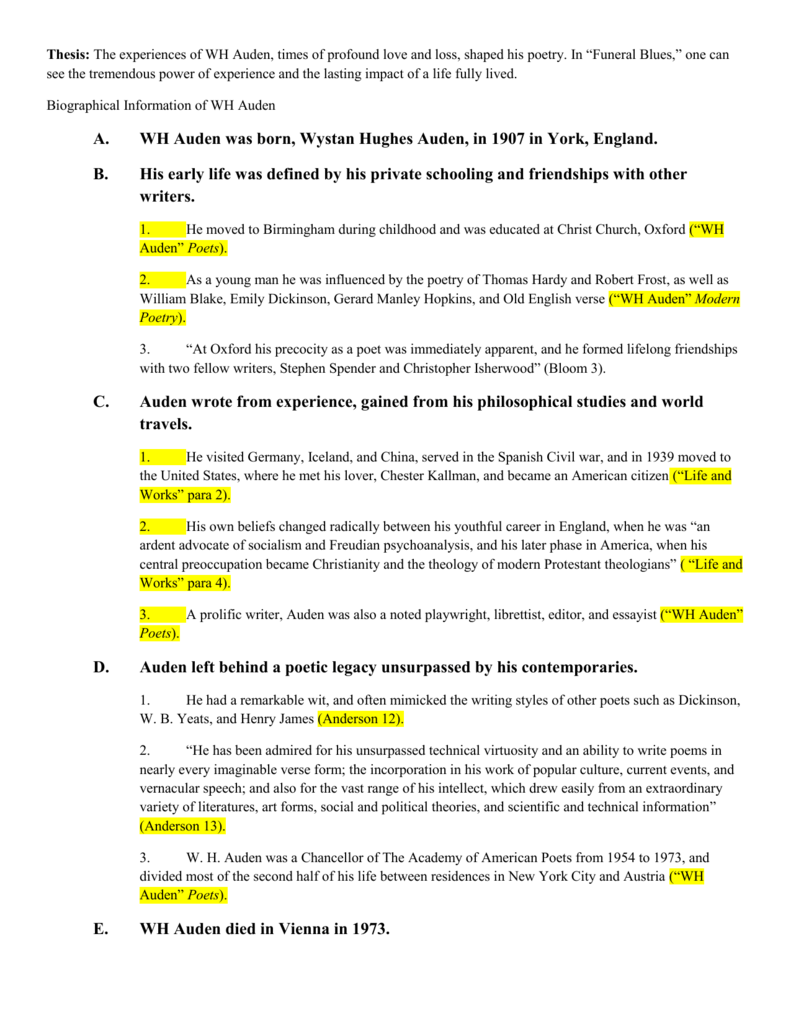
Funeral Blues By Wh Auden Theme Blogs
W. H. Auden, born in 1908 in York, is considered the greatest Anglo-American poet of the twentieth century. Encyclopedic in scope and technical achievement, his four hundred poems elucidate everything from pop cliche to profound meditation. September 1, 1939, written at the outbreak of World War II and widely circulated after September 11, 2001.

Funeral Blues Stop all the Clocks by W. H. Auden Analysis YouTube
" Funeral Blues ", or " Stop all the clocks ", is a poem by W. H. Auden which first appeared in the 1936 play The Ascent of F6. Auden substantially rewrote the poem several years later as a cabaret song for the singer Hedli Anderson. Both versions were set to music by the composer Benjamin Britten.

Funeral Blues W.H. Auden Funeral blues, Auden funeral blues
Summary and Analysis Editors Rating 4.6 Meaning of the Poem Funeral Blues is a poem by W. H. Auden. An early version was published in 1936, but the poem in its final, familiar form was first published in The Year's Poetry (London, 1938). Death is the subject and main theme of the poem.

Funeral Blues Poem Analysis Line By Line Rafa
Funeral Blues By W. H. Auden Read by Simon Callow Stop all the clocks, cut off the telephone, Prevent the dog from barking with a juicy bone, Silence the pianos and with muffled drum Bring out the coffin, let the mourners come. My working week and my Sunday rest, Credits Discover more poems Who's Who By W. H. Auden September 1, 1939 By W. H. Auden
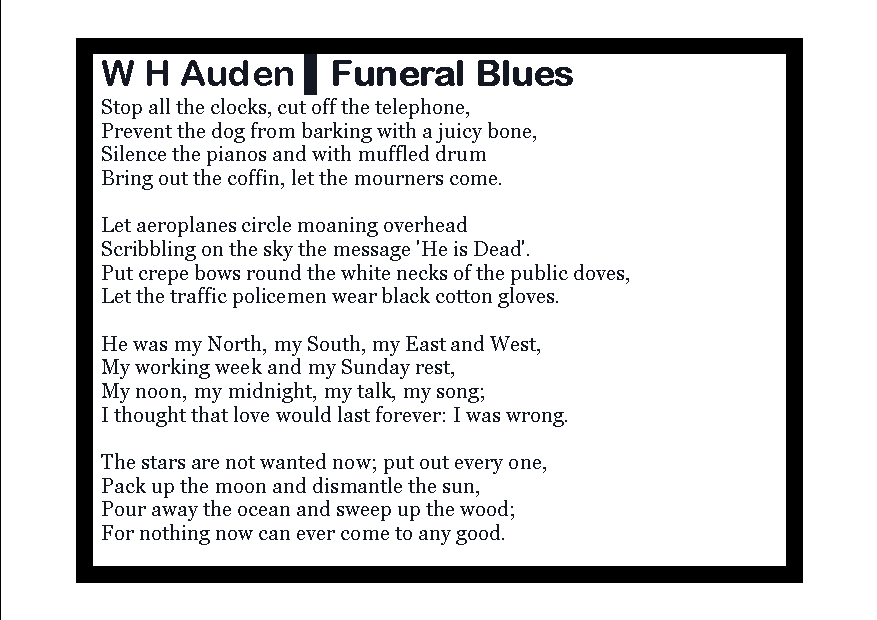
W H Auden ⁞ Funeral Blues
Background "Funeral Blues" is a poem written by W.H. Auden. The final version of the poem was first published in 1938 in the anthology The Year's Poetry. Structure Even from the title, one can deduce the poem is an elegy. The content of the lines throughout the poem affirm it is, indeed, an elegy.

a poem written by w h auden in the snow with trees and sky behind it
Walter John de la Mare, OM, CH (/ ˈ d ɛ l ə ˌ m ɛər / ;[1] 25 April 1873 - 22 June 1956) was an English poet, short story writer and novelist. He is probably best remembered for his works for children and for his poem "The Listeners". He also wrote some subtle psychological horror stories, amongst them "Seaton's Aunt" and "Out of the Deep".
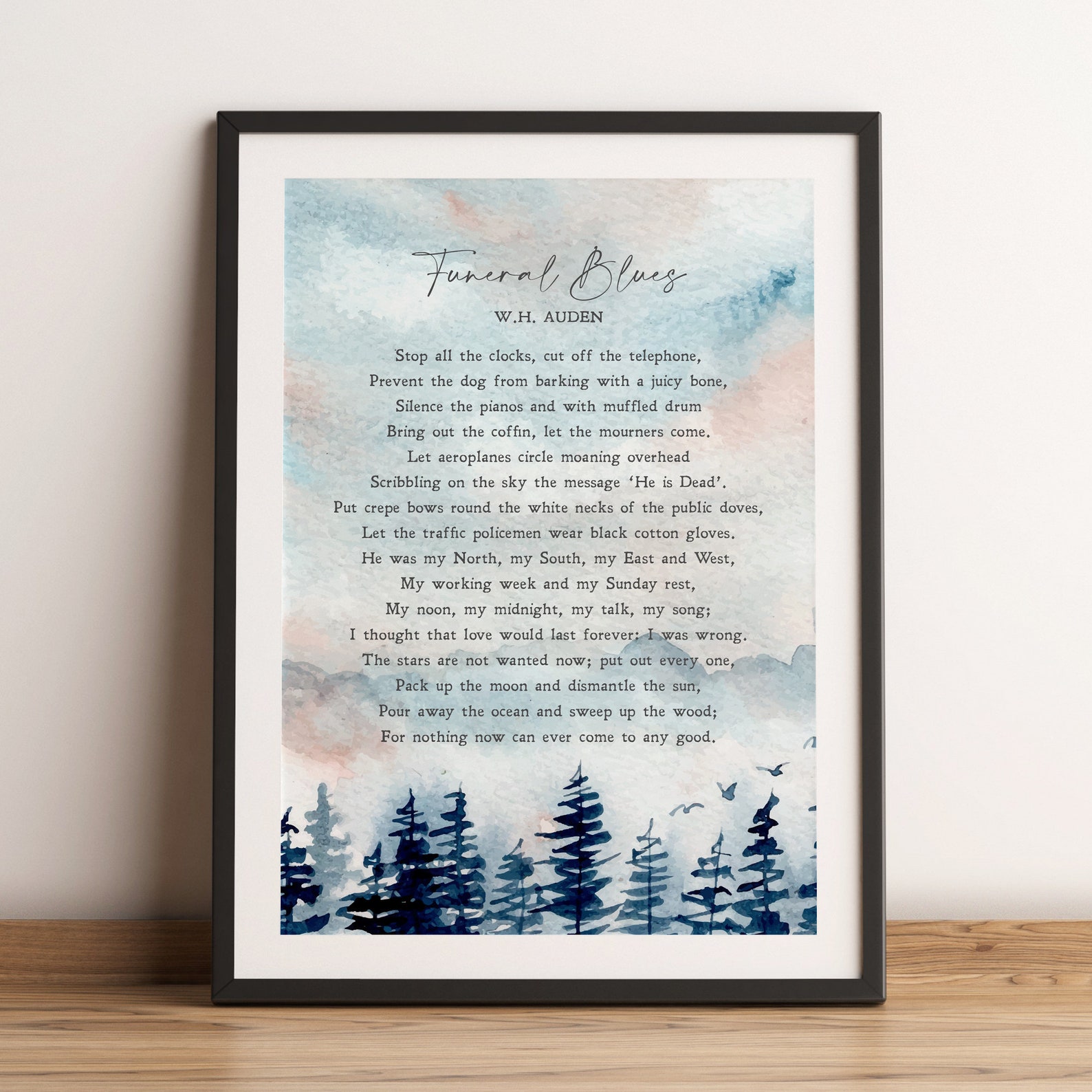
Funeral Blues W. H. Auden Poem Grief Mourning Etsy
Funeral Blues By: W. H. Auden Stop all the clocks, cut off the telephone, Prevent the dog from barking with a juicy bone, Silence the pianos and with muffled drum Bring out the coffin, let the mourners come. Let aeroplanes circle moaning overhead Scribbling on the sky the message 'He is Dead'.
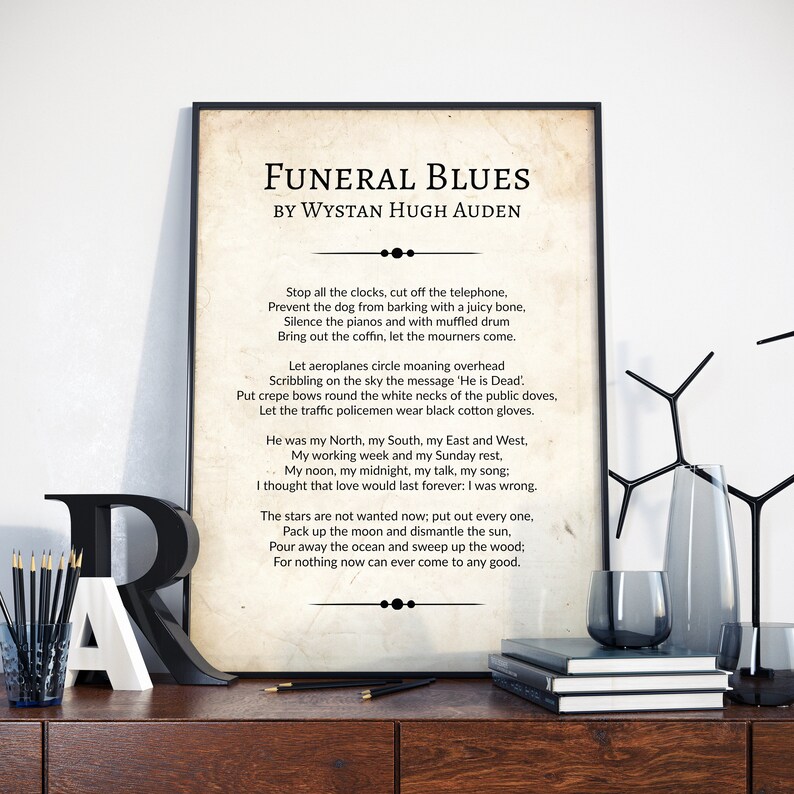
Funeral Blues by Wystan Hugh Auden Funeral Blues Poem Poster Etsy
"Funeral Blues" was written by the British poet W. H. Auden and first published in 1938. It's a poem about the immensity of grief: the speaker has lost someone important, but the rest of the world doesn't slow down or stop to pay its respects—it just keeps plugging along on as if nothing has changed.

Funeral Blues Wh Auden Poem Rafa
Funeral Blues by W H Auden - Famous poems, famous poets. - All Poetry Anton Jarvis · Funeral Blues by W.H. Auden Funeral Blues Stop all the clocks, cut off the telephone, Prevent the dog from barking with a juicy bone, Silence the pianos and with muffled drum Bring out the coffin, let the mourners come. Let aeroplanes circle moaning overhead

Funeral Blues, W H Auden Funeral blues, Funeral, Poetry projects
WH Auden's 'Funeral Blues' poem, sometimes known as 'Stop All the Clocks', is one of the most loved and most read at memorial services. It's been that way ever since it was beautifully recited by actor John Hannah in the enormously successful 1994 English romantic comedy: Four Weddings and a Funeral.
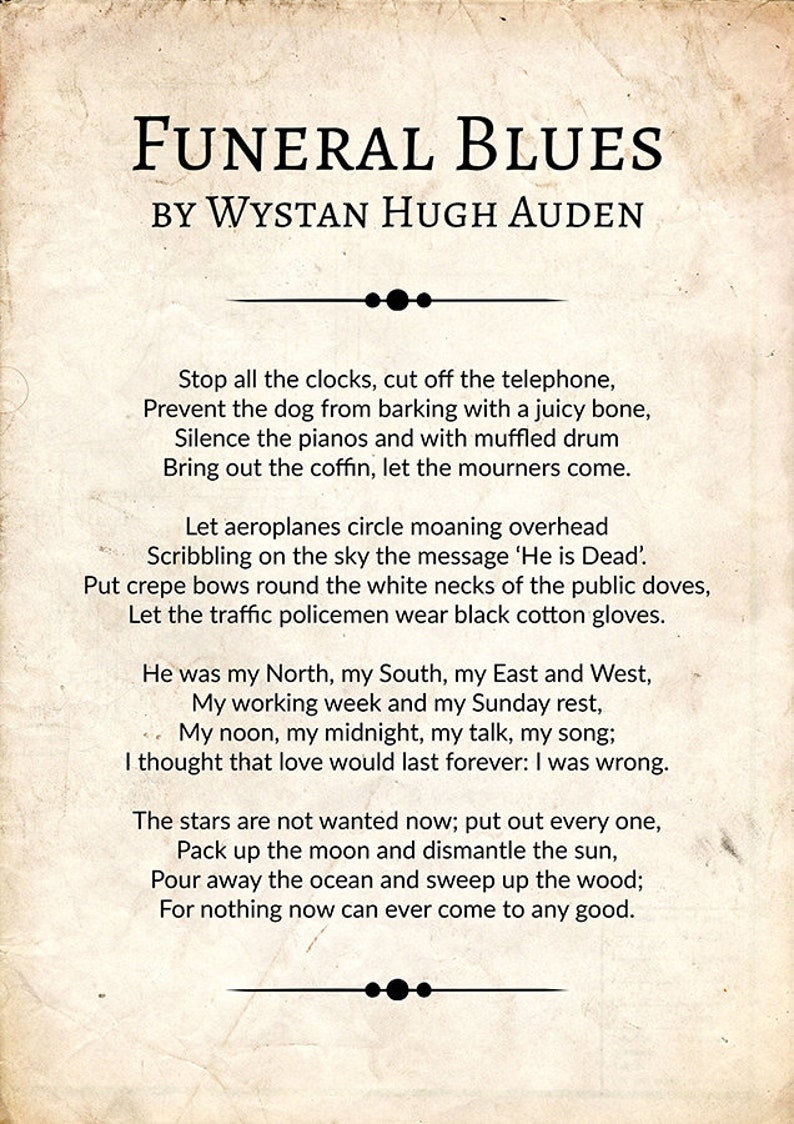
Funeral Blues by Wystan Hugh Auden Funeral Blues Poem Poster Etsy
1. ' Stop all the clocks '. Also known as 'Funeral Blues', this poem, one of Auden's 'Twelve Songs' originally published in 1936, needs no introduction, perhaps. Since it was recited in the funeral in the 1994 film Four Weddings and a Funeral, it achieved worldwide fame and brought Auden's poetry to a whole new audience.

auden poem in four weddings and a funeral Pesquisa Google Funeral
'Funeral Blues,' also known as 'Stop all the Clocks,' is arguably Auden's most famous poem. It was first published in 'The Year's Poetry' in 1938. Read Poem Poetry+ Guide Share Cite W.H. Auden Nationality: American W.H. Auden was a celebrated and prolific British-American poet who also wrote essays, reviews, and plays.
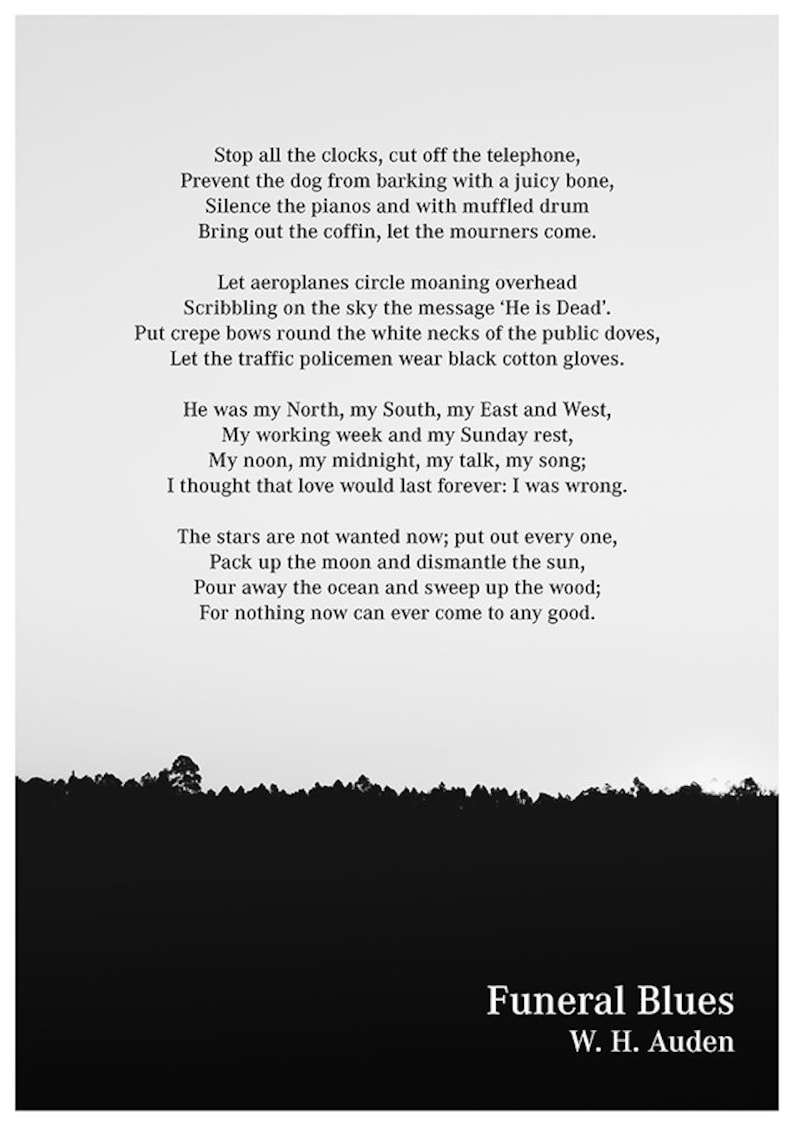
W. H. Auden Funeral Blues Wystan Hugh Auden Wystan Hugh Etsy
The poem was then included in Auden's poetry collection of 1936 (sometimes under the book title Look, Stranger!, which Auden hated). The poem was titled "Funeral Blues" by 1937, when it was published in Collected Poems. Here it had been rewritten as a cabaret song to fit with the kind of burlesque reviews popular in Berlin, and it was.
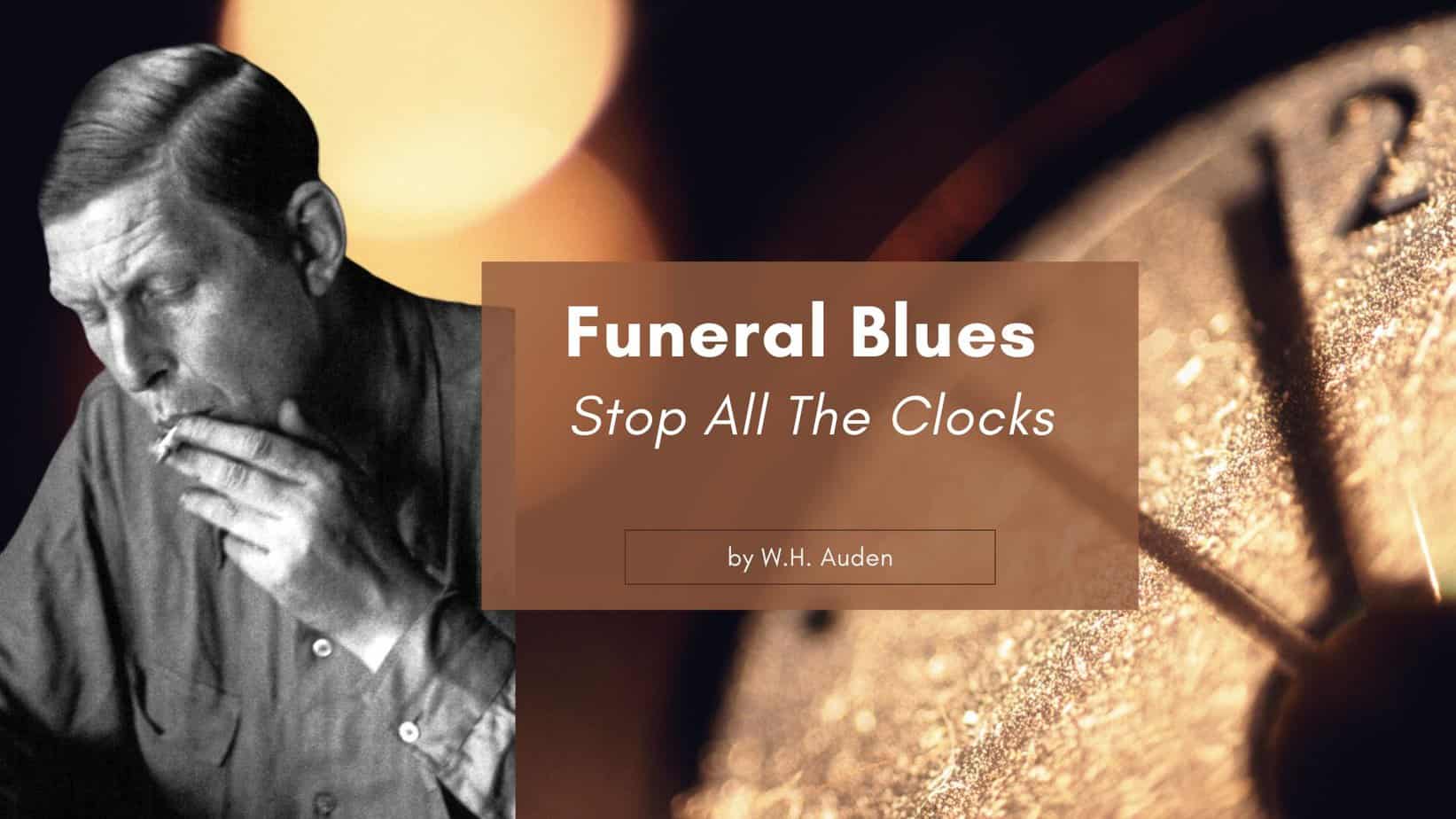
Funeral Blues Funeral Poem The Art Of Condolence
In "Collected Shorter Poems" it appears as one of the 12 songs. But he also pub'd it as "Funeral Blues." I am also pretty sure the poem first appeared in the verse play "The Ascent of F-6" which Auden wrote with Christopher Isherwood.' - Richard Elias "Auden intended it to be set to music, and it has been used as lyrics at least three times.